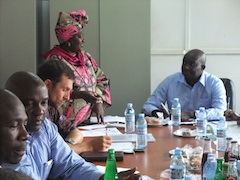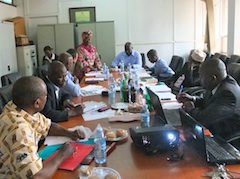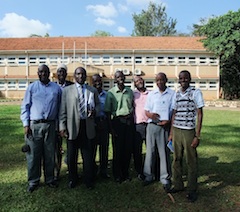| |
|
 |
Faith groups link up with Uganda's Ministry of Agriculture
February 4, 2013:
 |
 |
 |
Hajjat Sebyala makes a presentation during the meeting between faith groups and the Ugandan Ministry of Agriculture, Animal Husbandry and Fisheries |
An exciting new partnership is being explored between faith groups and Uganda’s Ministry of Agriculture, Animal Industry and Fisheries (MAAIF) that could be a model for other nations in Africa.
At a meeting in Kampala last month, faith leaders and MAAIF representatives came together to discuss how they might work together to manage land more sustainably and in the process support Uganda’s objectives as part of its membership of TerrAfrica.
TerrAfrica is a regional initiative set up in 2005 to improve land management in sub-Saharan Africa. One of its main roles is to improve co-ordination between national governments, the international development community and civil society – of which faith groups are the biggest part.
The meeting was called by Stephen Muwaya after he attended ARC’s Nairobi Celebration to launch the faiths’ long-term action plans on the environment in September 2012. As MAAIF’s sustainable land management coordinator, he is also responsible for overseeing its TerrAfrica activities.
 |
 |
 |
Meeting between faith groups and MAAIF |
So what exactly do we mean when we talk about sustainable land management? Broadly speaking, it is a wide range of strategies aimed at reducing soil erosion, restoring land fertility and increasing food productivity while at the same time protecting biodiversity the environment.
MAAIF's priorities in Uganda include promoting conservation agriculture (an environmentally friendly way of farming that also boosts crop yields), encouraging more trees to be planted as part of reforestation efforts, increasing the use of sustainable energy technologies such as fuel-efficient stoves and biogas; water conservation; and increasing income-generating activities linked to sustainable land management practices.
Three areas for possible partnership with faith groups were suggested in the meeting:
Faith groups could advocate for sustainable land management practices;
Faith groups could place their land under sustainable land management practices-friendly activities; and
Faith groups could integrate sustainable land management practices into their livelihood support interventions.
 |
| Suggested areas of faith sustainable land management include: advocacy on sustainable land management practices; sustainable management of faith-owned land; and integration of sustainable land management practices in livelihood support interventions. |
|
 |
 |
It was a useful and inspiring meeting, with much lively and informative discussion, and members have agreed to set up a forum of faith groups working in sustainable land management in Uganda.
MAAIF agreed to organise a field visit for faith representatives to look at some of its demonstration sites, as a first step, and then to organise a workshop, probably at the Mukono Zonal Agricultural Research Institute in March this year, to look at sustainable land management issues in greater detail and also to consider what kind of joint projects MAAIF and the faith groups could develop.
Faith groups have also agreed to provide MAAIF with details of land which could be put under sustainable land management.
In preparation for the MAAIF workshop, Muguluma Hamed, executive director of Humanitarian Efforts and Relief Uganda (HEAR Uganda) has invited around 30 faith representatives as well as the Food and Agriculture Organisation's national representative, to a meeting in Kampala later this month to discuss the current state of agriculture in Uganda and how sustainable land management can improve it.
 |
 |
 |
Smiles all round after an MoU is signed between HEAR Uganda and UMYA and Uganda's National Forest Authority |
These are exciting developments in Uganda and ARC is very hopeful that such growing cooperation between faith groups and the Ugandan government could provide a model for how to involve faith groups in sustainable land management projects in other TerrAfrica countries.
Closer links with forestry tooHEAR Uganda and its partner UMYA (the Uganda Muslim Youth Assembly) have just signed a Memorandum of Understanding with the National Forest Authority.
The MoU will lead to many practical joint projects between them and is another exciting development in moves to forge closer links between faith groups and Ugandan government bodies.
It came about after HEAR Uganda and UMYA invited the NFA's executive director Michael Mugisha to give the keynote address at the launch of their long-term plan on the environment. He was so impressed by what he heard that he suggested they develop an MoU together.
|
 |
 |
|
|
|
|
|
 |
September 18, 2012:
UNEP says working with faiths is "top of our priorities" in Africa
UNEP Regional Representative, Mounkaila Goumandakoye told an ARC gathering of senior African faith leaders that working with religions will go to the top of the UNEP agenda in Africa. |
 |
List of African commitments
In September 2012, 25 faith groups from 11 countries in sub-Saharan Africa will launch their Long-Term Commitments for a Living Planet at ARC's Nairobi Celebration at the All Africa Conference of Churches' Desmond Tutu Conference Center. |
 |
African faith resources
African faith resources on the environment |
 |
 |
|
|

